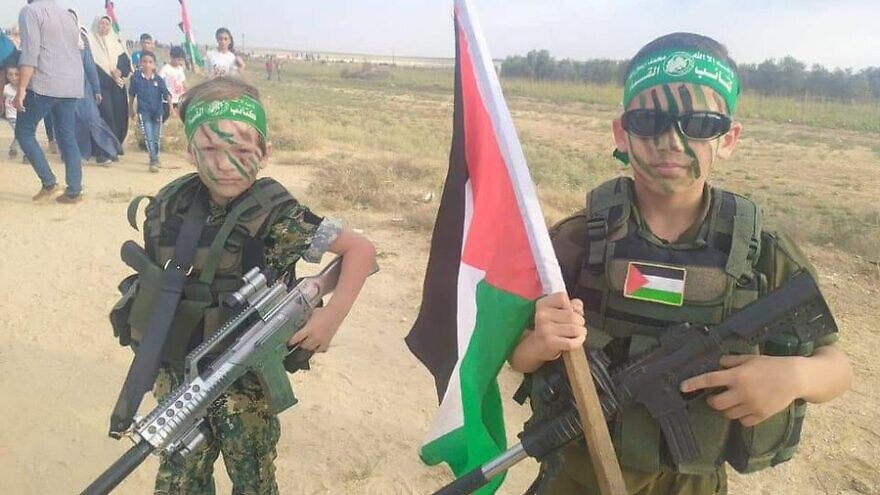A clerical body in Iraq that recently issued a groundbreaking fatwa—a legal ruling on a point of Islamic law—against Hamas for oppressing the Palestinians in Gaza, on Thursday released a stinging indictment of the Islamist terrorist organization detailing its decision.
The document published by the Islamic Fatwa Council—a body of senior Sunni and Shi’ite clerics headquartered in the city of Najaf—spells out why they issued the fatwa two weeks ago.
“It is the view of the Islamic Fatwa Council that Hamas has been promoting and engaging in ISIS-like behavior against Muslims and Palestinians alike, under the guise of ‘resistance,’ ” states the 35-page document, titled “Jurisprudential Resolution of Islamic Fatwa: F02301.”
The fatwa lists 15 “charges,” including the “use of child soldiers,” “theft of international aid,” “extortion and racketeering,” “corruption of the Palestinian education system,” “abuse of power” and “falsely accusing Palestinians of treason.”
Charge No. 5 details Hamas’s use of “child soldiers” to carry out terrorist attacks, and makes clear that it violates religious law.
“Islamic law prohibits the misuse of women and children in conflict,” the document states. “However, … Hamas has been recruiting and training child soldiers for terrorist activity that violates Islamic laws of conflict.”
The fatwa states that “it is prohibited to pray for, join, support, finance or fight on behalf of Hamas,” and finds the Islamist group “bears responsibility for its own reign of corruption and terror against Palestinian civilians in Gaza.”
The fatwa and this subsequent legal indictment were triggered by a series of emotionally riveting video testimonies of Palestinians in the Gaza Strip, dubbed “Whispered in Gaza,” which was released in January by the New York-based Center for Peace Communications. The 25 video testimonies by dozens of Palestinians, whose identities were hidden and voices distorted to ensure their safety, were shown in seven languages on four continents, and viewed more than 5 million times, mostly in the Arab world.
The clips, which sought to puncture Hamas’s dominance of the narrative in the region, evoked a public outcry in the Arab world.
Hamas on the defensive
“This is a very significant blow for Hamas to have to defend itself on religious and Koranic grounds,” said Robert Satloff, executive director of the Washington Institute for Near East Policy, in a telephone interview with JNS. “It compels Hamas to play defense—an unusual position for them—against Muslim religious figures who are critical of Hamas’s self-identification as an Islamic movement.”
Satloff had previously predicted that the video series would “shake the foundations of Islamist rule more than Israeli rockets or Egyptian border closures.”
“Ultimately, the fate of Hamas will be determined by the Palestinians themselves, but the environment matters,” he said.
It remains to be seen whether other prominent Islamic religious institutions will accept or reject the council’s conclusions, but silence is indicative of their approval of the fatwa, Satloff said.
Meanwhile, as fallout over the religious legal ruling continues in the Arab world, selections of the video clips and a video of the fatwa are being screened on Thursday evening at the French National Assembly in front of deputies and senators.
“Much has been said about the impact of Israeli policies and actions on the civilian population in Gaza—and rightly so,” said Ghaith al-Omari, a Palestinian expert at the Washington Institute. “Yet the conduct of Hamas, the de facto rulers of the Strip, who have created an oppressive, stifling reality for the majority of Gazans, has received much less attention.”
Al-Omari said the fatwa represents a direct challenge to Hamas’s legitimacy and undermines its claim to represent Islam. “It may not immediately impact its rule over Gaza since it maintains this rule by force. But over the longer term, such a pronouncement represents a serious challenge to Hamas’s narrative.”
“At this pivotal time, Arabs and Israelis—Jews, Christians and Muslims—can develop the region together and bring security to the area and beyond,” said Joseph Braude, president of the Center for Peace Communications. “Otherwise, extremist forces win the day and bring the region to ruin.
“It all depends on how creative and determined proponents of peace and partnership turn out to be,” he said.


























